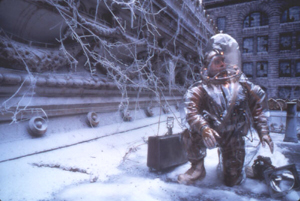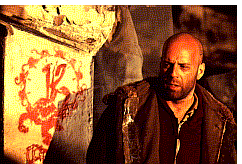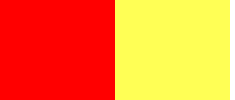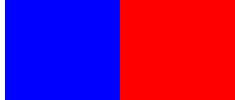THE TERRY GILLIAM FILES // "TWELVE MONKEYS" (1995) |
Interview with Editor Mick Audsley |  |
|
Mick Audsley has worked extensively with Stephen Frears (including MY BEAUTIFUL LAUNDRETTE, PRICK UP YOUR EARS, SAMMY AND ROSIE GET LAID and THE GRIFTERS), and also edited Neil Jordan's INTERVIEW WITH THE VAMPIRE. His earlier projects include working on sound for Peter Greenaway's gargantuan mock-documentary THE FALLS. Audsley's friend, editor Lesley Walker (who worked on FISHER KING), suggested him to Gilliam for TWELVE MONKEYS when she was unavailable — coincidentally, cutting a Stephen Frears film. Audsley spoke in the TWELVE MONKEYS production offices set up in a hotel overlooking Baltimore in Spring 1995.
Morgan: What do you feel you contribute as an editor? Audsley: The purpose of the cutting room is really to provide a home, a safe base, where we can all kind of lean on each other, share all our doubts and fears and joys, and be extremely open and frank about what's going on. It's the engine room of making a film. What attracted you to this project?
Also, it's so nice to be dealing with something which is not an imitation of another film in any way. Often there's a terrific amount of weight pushing you in the direction of films which have already been made, which is always a constant problem for us in the cutting room, trying to make films that come around the corner and approach things from another viewpoint, and not from the limitations of a horror film, a mystery film, thriller, etc. How did you prepare for this picture, given the story's complexity? One thing we agreed was to try to cover this film as well as possible: Lots of angles and material, because we don't quite know what the journey of the film is and how it's going to read. It's going to be a long journey and we've got to pack enough socks. And Terry keeps saying, `Look, this one's got a hole in it!' I find it exhausting, because you've got to take so much of the film on board and regurgitate it, hopefully intelligently, in such a short period of time. In order to meet that first assembly deadline of two weeks after shooting ends, it means I can only really allow that same time they take to shoot something, to edit it the first time around. You never feel you've got time to go back and refine anything. Sometimes the shooting ratio is quite high. There was one particular scene very early on, a car scene, which was I think two and a half hours of material for a three minute scene, and it took me a day just to even look at it all, let alone start to make selections. You're not editing this film on tape? I haven't done that. The whole of the editing world is sort of shifting away from film, into computer or digital editing. Terry and I discussed doing that, but we just somehow felt — rightly or wrongly — that we were going to do this film the old-fashioned way with these wonderful old bits of equipment. And some days I feel that was a mistake; maybe we should have made the leap, because the manipulation of material is very fast. But you can't make a reel like I do here and stick it in a theatre and look at it and there it is: a cinema image. And there's something very satisfying about touching it. To see this reel by reel, the result of all these weeks of work. People ask me, 'How long does it take you to cut a film?' Well, normally it's a year of my life — anything between 9 months and 13 or 14 months. And they can't believe how you can spend so long cutting a film. It's always hard to explain that actually it feels like you're running to catch a bus the whole time but you never ever get on board, because each stage has a very tight time frame to work with; during shooting I'm always worrying that I'll get this first cut together and be disciplined enough to make a sketch of the film and not get bogged down with details, which requires a lot of discipline, because you feel anxious to put on something which is particular and not too fat, that actually allows you to see what this thing is. And then the next stage is the director's cut, so you want to give them as many hours as you can, so they feel happy about what they will present formally to the producers. Then you're rushing to get to your preview, which means making rush soundtrack, then taking all the preview information on board (or not, as the case may be), and it's just a lot of hoops to get through. Terry explained it well the other day: He said it's like a relay race and we just keep handing the baton off to each other in order to last the distance, which is kind of what it is, cause you get what I call 'film blindness' — it sets in at a certain stage and you can't really look at [the film], you can't read it in the way in which the audience does. Our sole function is to represent the audience, really, and try to manipulate them with controls. So when film blindness sets in, it's a difficult thing. [On] some films I've assembled them and we've left them alone completely. It won't be like that on this. THE SNAPPER, which was this completely different sort of film, we assembled it and three days later we looked at it and that was it — it was done. It was just the way, it was very well designed, a simple story really. But this is a much, much more complex piece of work. I usually feel in my bones that a film is finished, although there's endless opportunities to muck about with it, you can go on forever. Like David Lean, refining a "director's cut" of LAWRENCE OF ARABIA 25 years later. You can go on forever. I feel somehow films got longer, which is some lack of discipline on the part of filmmakers, and I think that's a shame. What the longest film you've done? Longest in screen time? Well, away from the commercial market I worked on a number of, guess you can call 'virtually' independent films with Bill Douglas. He made a film about the Tolpuddle Martyrs* called COMRADES, that was two films really in one, with an interval, [and] it was nearly four hours long. But it was gigantic. It should have been much shorter, but we never persuaded Bill as we should. He was a sort of filmmaker-poet (Terry's sort of a filmmaker-painter-poet). That was too long, it should have been cut. I used to wake up screaming in the night wanting to cut that film, being unable to get clearance. There was a wonderful film to be made in there and he never got it out. I regret it. [* Referring to English unionists fighting in the 19th century for decent wages.]
How do you see the actors' work being filtered as you select takes? Bruce presents a softness in him as well as this tough, daring sort of convoluted character. That's a much more interesting situation, and we want to reveal that interior. I mean, he is a man who's feeling for the future of the world, so that's sort of what you want to present: a man who is suffering. He just has a tendency to slip off into the tough guy behavior, so I'm always looking for the softer side of the way he presents the conflict. We've strained to make sure we choose pieces which represent that idea and hopefully that's right, that we've picked the right path. But a lot of the film will be critical to our understanding of what his emotional state is anyway, because the proximity with the other scenes will affect our perception of what he's feeling. They're like colors. Putting red and yellow together, you get something, but if you put the same red next to a blue, it looks like a different red. I think all films have that quality, but in this case the scenes are going to have a big impact on each other, which is why we're getting excited seeing them joined up finally. After all these weeks!
Madeleine has been very consistent. Brad was wonderful. I know him from the vampire film, so I couldn't believe it was the same man. He was fantastic. He's got a wonderful part, full of energy and quirkiness. He's going to be a really interesting actor. He's turning from a star into an actor-star. He's moving from the most desirable man in the world, from a female point of view, to a really solid actor. His stuff has been a pleasure to work with. How are the pieces fitting together, since they are meant to represent disparate times, places, viewpoints? We're finding cuts between scenes very, very interesting — when you go out of a dream or into a dream, or from the present to the future and back, all those things have a particular meaning in this film, because it is a mosaic of events which sort of swirl around in this loop. So transitions, moving scene-to-scene, are somehow the critical part of the language of the film rather than just moving the story forward. But I knew this film would be a big challenge editorially. Because it's not just `This happened, then this happened.' Things will only have meaning when they're placed in the montage. Emphasis will only be correct when it's set up and paid off somehow. The question becomes, exactly what information do we need to give to the audience at this particular point? How much do we let out, and how much do we hold back?
Postscript: Audsley's most recent credits include Stephen Frears' THE VAN (the third in the Barrytown trilogy, THE SERPENT'S KISS and HARRY POTTER AND THE GOBLET OF FIRE. He recently completed Terry Gilliam's THE IMAGINARIUM OF DR. PARNASSUS.
| |||||||||||||||
copyright 1995, 2009 by David Morgan
All rights reserved.








 The fun of the enigma, that's comprehensible but mysterious. There's the see-saw between your dilemma of saying `Oh right, [Cole]'s bonkers, we're not believing him,' and `Oh no, he's not bonkers.' And this seesaw through the film is what we editorially have to manufacture correctly. So all the time, the carpet is being pulled away from under you. The minute
you start to believe one set of information, then there's something which undoes it again. So the use of closeups and extreme wide angle shots is really to do with shifting
the balance inside and out of [Cole's] state of mind.
The fun of the enigma, that's comprehensible but mysterious. There's the see-saw between your dilemma of saying `Oh right, [Cole]'s bonkers, we're not believing him,' and `Oh no, he's not bonkers.' And this seesaw through the film is what we editorially have to manufacture correctly. So all the time, the carpet is being pulled away from under you. The minute
you start to believe one set of information, then there's something which undoes it again. So the use of closeups and extreme wide angle shots is really to do with shifting
the balance inside and out of [Cole's] state of mind.


